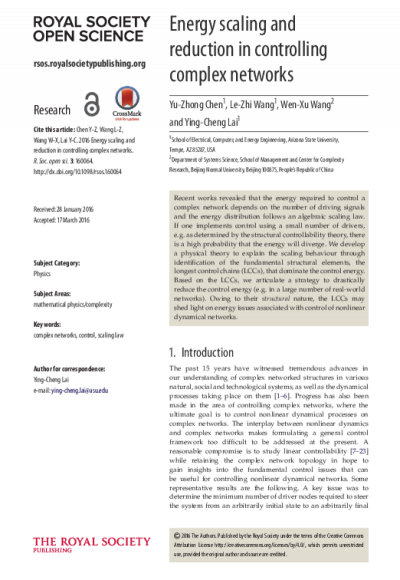Recent works revealed that the energy required to control a complex network depends on the number of driving signals and the energy distribution follows an algebraic scaling law. If one implements control using a small number of drivers, e.g. as determined by the structural controllability theory, there is a high probability that the energy will diverge. We develop a physical theory to explain the scaling behaviour through identification of the fundamental structural elements, the longest control chains (LCCs), that dominate the control energy. Based on the LCCs, we articulate a strategy to drastically reduce the control energy (e.g. in a large number of real-world networks). Owing to their structural nature, the LCCs may shed light on energy issues associated with control of nonlinear dynamical networks.
Details
- Energy Scaling and Reduction in Controlling Complex Networks
- Chen, Yu-Zhong (Author)
- Wang, Le-Zhi (Author)
- Wang, Wen-Xu (Author)
- Lai, Ying-Cheng (Author)
- Ira A. Fulton Schools of Engineering (Contributor)
-
Digital object identifier: 10.1098/rsos.160064
-
Identifier TypeInternational standard serial numberIdentifier Value2054-5703
-
The final version of this article, as published in Royal Society Open Science, can be viewed online at: http://rsos.royalsocietypublishing.org/content/3/4/160064
Citation and reuse
Cite this item
This is a suggested citation. Consult the appropriate style guide for specific citation guidelines.
Chen, Y., Wang, L., Wang, W., & Lai, Y. (2016). Energy scaling and reduction in controlling complex networks. Royal Society Open Science, 3(4), 160064. doi:10.1098/rsos.160064


